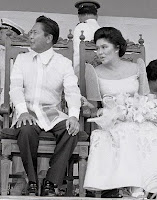False anger: to the Filipina on International Women's Day
 [Reviving this gem in commemoration of International Women's Day.]
[Reviving this gem in commemoration of International Women's Day.]Rape cases often boil down to a her-word-against-his and a his-word-against-hers battle. As if that weren't enough, in the Philippines, the pervading primitivism brought about by our cultural baggage routinely adds a thick wrapper of moronic drama around rape, reducing the facts-and-logic component of most rape cases to an insignificant nucleus within a thick morass of "public scrutiny".
As such, the only real contribution of the public scrutiny and "analysis" that sensational rape cases attract (all brokered at a profit of course by the Philippine Media) is premature judgment. The kind of trial-by-media and premature judgment we have become renowned for in such instances is a manifestation of a two-fold psychosis that our society suffers from as outcomes of (1) our inability to get over our four-century subjugation by colonial powers and (2) our narrow dogmatic regard for human sexuality.
The first plays upon that all-too-familiar vicitim mentality that continues to afflict us to this day. It is succinctly encapsulated by Ishmael Ahab in the following excerpt from his recent article:
Soldiers of the American Government, since they stepped on our country, raped and abused many Filipinas. Accounts of rape during the Philippine-American war is not lacking and up until now the American Government did not issue any official statement seeking forgiveness for their brutality during that war.
I dunno, but I recall how one of the Philippine blogosphere's more astute commentators once quipped how "we cannot keep what we cannot defend"; a principle that can be extended to include the toothless way by which we keep raw and open the wounds of our hapless people's "victimisation" in the various battles fought by foreign armies on Philippine soil. As often is the case, it begs the usual question:
Where are the results?
Consider this question in light of how the armies and agents of the Jewish Nation continue to hunt down Nazi war criminals all over the world -- often rooting them out from undocumented blissful obscurity in some banana republic and dragging them kicking and screaming to court. It is the kind of conviction only seen in a people who have a clear definition of what they stand for to sustainably fuel their efforts. Ningas-cogon anyone? It is in this light that we learn to appreciate the utter flaccidity of The Filipino "Laban" Rhetoric that infests our modern literature. Though while we continue to go around stomping our feet about this and that instance of "injustice" against our hapless lot, the reality is we as a people simply lack the cojones to exercise our prerogatives.
All Filipinos have to show for after all the "L" shaped finger waving from the lofty moral highground we imagine ourselves to stand upon is judgement over the way the Big Bad American, the Mayabang (arrogant) Kastila, and the Siba (greedy) Filipino-Chinese "victimise" Juan de la Cruz.
And so we wave our clenched fists in the air (in the tired old cliche'd way we tend to do) and scream "It is time for us to stand for the Filipina. Let us make rape history" (as if rape ever will be). But let us look underneath the slogan and examine what underpins it. When we invoke the kind of poetic license we learn at WanBol Emementary School and regard the oxymoron that is "The Filipina" we see Maria Clara. But when we take stock of current popular perceptions and sentiments including the sort of "tourists" the Philippines tends to attract, we see something else.
As Seinfeld is wont to say, what's up with that?
What's up with all this brings us to the second aspect of our collective psychosis. We continue to use an old caricature to guide our ideas of what the quintessential Filipino Woman is. In reality, the Filipina is now shaped by an agglomeration of various modern-day influences. Central to this is the hypocrisy of a double standard that favours the Filipino male when it comes to infidelity and premarital intimacy.
And so the irony continues to escape the famously vacuous "national debate" -- how we as a people have actually failed to protect our own women from the very demons we wave our fists at in flaccid anger. Consider that we as a nation now rely on the armies of female workers we send overseas to fund our appetite for cheap trinkets and dessicated packaged food imported from China and Indonesia. We routinely see mothers separated for years from their children and call them "heroes". Our moronic dogmatism routinely deprives the most helpless of women from real and modern methods of safe contraception.
Our sick fascination with rape (when it should be seen for what it is -- a crime for which justice brought about by due process is dispensed swiftly) and the accompanying "disgust" we relish even as we soak up every little morsel of hearsay surrounding each case, says a lot about us as a people.
[This article was originally published by the author on 20 May 2009 in the now-defunct FilipinoVoices.com.]




Comments
Post a Comment